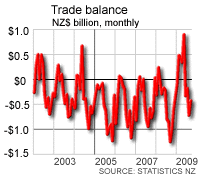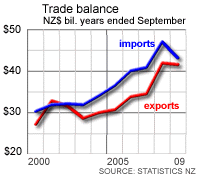 New Zealand recorded its fourth consecutive monthly trade surplus in May as the value of merchandise imports fell 20.7% from a year before while merchandise exports rose 5.8%. The fall in imports was the largest since February 1993. (Update 1 includes economist comment.)
This improvement should help reduce New Zealand's current account deficit, but it does show consumer spending on imports remains weak and the stronger New Zealand dollar through June may constrain further improvement in the trade balance later in 2009.
The surplus of NZ$858 million in May was 21.7% of exports. By this measurement, this was the largest trade surplus since June 1993, Government Statistician Geoff Bascand said. The value of exports over the month was NZ$3.96 billion.
For the year ending May 2009, New Zealand had a trade deficit of NZ$3.04 billion. This was the smallest deficit for a May year since May 2003.
Economists had expected a monthly surplus of around NZ$250 million. A Bloomberg poll showed the median forecast for the yearly balance was a NZ$3.64 billion deficit.
Exports to China accounted for 80% of the overall 5.8% increase in exports with milk powder, butter, and cheese; and logs, wood, and wood articles making the largest contributions, Bascand said. New Zealand's free trade agreement with China came into effect at the start of October last year.
New Zealand recorded its fourth consecutive monthly trade surplus in May as the value of merchandise imports fell 20.7% from a year before while merchandise exports rose 5.8%. The fall in imports was the largest since February 1993. (Update 1 includes economist comment.)
This improvement should help reduce New Zealand's current account deficit, but it does show consumer spending on imports remains weak and the stronger New Zealand dollar through June may constrain further improvement in the trade balance later in 2009.
The surplus of NZ$858 million in May was 21.7% of exports. By this measurement, this was the largest trade surplus since June 1993, Government Statistician Geoff Bascand said. The value of exports over the month was NZ$3.96 billion.
For the year ending May 2009, New Zealand had a trade deficit of NZ$3.04 billion. This was the smallest deficit for a May year since May 2003.
Economists had expected a monthly surplus of around NZ$250 million. A Bloomberg poll showed the median forecast for the yearly balance was a NZ$3.64 billion deficit.
Exports to China accounted for 80% of the overall 5.8% increase in exports with milk powder, butter, and cheese; and logs, wood, and wood articles making the largest contributions, Bascand said. New Zealand's free trade agreement with China came into effect at the start of October last year.
 Exports to China, New Zealand's third largest export market in May, were up 96.7% from May 2008 to NZ$357 million. Exports to Australia were up 11.2% to NZ$780 million, and exports to the USA fell 6.2% to NZ$398 million.
Of the 20.7% fall in imports, 60% of this was from falls in petroleum products and passenger motor cars. Imports form Australia were down 17.7% to NZ$570 million, while imports from China rose 0.5% to NZ$480 million. The total value of imports over the month was NZ$3.1 billion.
New Zealand's monthly Trade Weighted Index (TWI) in May 2009 was 58, the highest since October 2008 (when it was 60.7). The TWI was 69.3 in May 2008.
ASB economist Jane Turner warned they were wary of the sustainability of trade surpluses:
Exports to China, New Zealand's third largest export market in May, were up 96.7% from May 2008 to NZ$357 million. Exports to Australia were up 11.2% to NZ$780 million, and exports to the USA fell 6.2% to NZ$398 million.
Of the 20.7% fall in imports, 60% of this was from falls in petroleum products and passenger motor cars. Imports form Australia were down 17.7% to NZ$570 million, while imports from China rose 0.5% to NZ$480 million. The total value of imports over the month was NZ$3.1 billion.
New Zealand's monthly Trade Weighted Index (TWI) in May 2009 was 58, the highest since October 2008 (when it was 60.7). The TWI was 69.3 in May 2008.
ASB economist Jane Turner warned they were wary of the sustainability of trade surpluses:
May's result was impressive with StatsNZ noting this was the largest surplus as percent of exports since June 1993. The trade balance has continued to surprise into the second quarter of 2009 and the annual trade deficit has made a strong recovery ($3.04 billion compared to a trough of $7.31 billion in February 2006). Last week's data showed that the stronger traded goods position drove a recovery the current account deficit to 8.5% of GDP (from 9%) and based off today's data we can expect further recovery over Q2. We remain wary on the sustainability of trade surpluses. Import volumes have fallen sharply over the past few months, but are likely to stabilise in the second half of this year, along with the bottoming out in domestic activity. Meanwhile, agricultural exports are traditionally seasonally weak over the second part of the year and the underlying weakness in other exports (such as manufactures) is likely to become more apparent.Your views and insights? We welcome comments and any further insights on this article and its source documents in the comments field below. Or if you want to remain under the radar please email bernard.hickey@interest.co.nz and we'll be in touch. We practice a form of collaborative journalism that aims to include the insights and expertise of our readers to improve our articles. That includes clearly identifying any errors and correcting them. We also update articles with relevant new information and commentary and will label our articles Update 2 etc. We know we don't know everything and we know we're not always right. We appreciate your help in constantly improving and deepening the knowledge and debate on interest.co.nz.

We welcome your comments below. If you are not already registered, please register to comment
Remember we welcome robust, respectful and insightful debate. We don't welcome abusive or defamatory comments and will de-register those repeatedly making such comments. Our current comment policy is here.